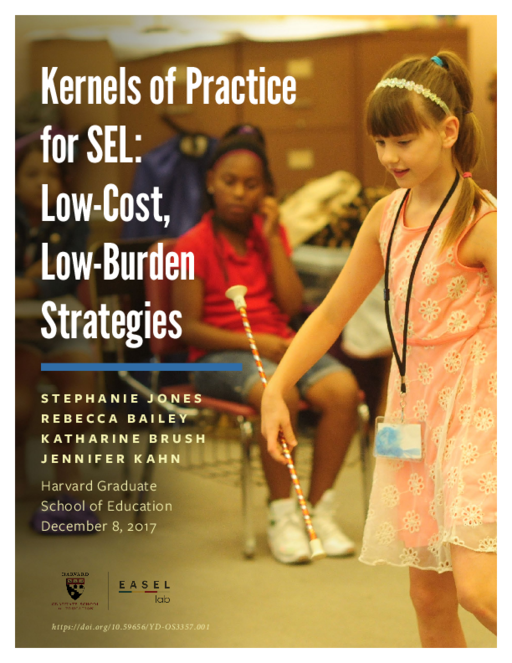Breadcrumb
- Wallace
- Reports
- Kernels Of Practice For Sel Low-...
Kernels of Practice for SEL
Low-Cost, Low-Burden Strategies

- Author(s)
- Stephanie Jones, Rebecca Bailey, Katharine Brush, and Jennifer Kahn
- Publisher(s)
- Harvard Graduate School of Education
Summary
How we did this
As part of an in-depth analysis of leading evidence-based SEL programs, the research team constructed an extensive database of the strategies and activities used by leading programs to target specific SEL skills. Using a pilot process, they began to comb data for common denominators of SEL practice across programs. This will ultimately generate a “menu” of kernels that includes materials and guidance for implementation.
Time and funding are two of many barriers to implementing social and emotional learning (SEL) programs at scale. These barriers are particularly challenging to overcome in low-income neighborhoods. Schools and programs seeking to implement SEL need more flexible and affordable supports.
This brief suggests that low-cost, targeted strategies called "evidence-based prevention kernels" may provide these supports.

We conceptualize kernels as low-cost, targeted strategies which, in our view, would represent the essential 'active ingredients' in the more comprehensive programs we know to be effective.
These evidence-based strategies, or kernels, address specific behaviors. They can be taught quickly. And they can be more feasible to implement than more comprehensive SEL programs, which are more time and resource-intensive and can be challenging to implement successfully.
- To help students manage emotions and behavior, for example, a teacher could use a deep-breathing exercise to help students calm down.
- To cultivate cognitive flexibility and understanding of social cues, they could use a non-verbal transition cue (like a hand signal) to signal a change in direction for the class.
- Or to promote prosocial behavior and resolve conflicts, they could have students share peer-to-peer written praise.
These are all kernel strategies that can be applied quickly across a variety of different contexts. They do not have to be tied to a specific curriculum.
When employed consistently, kernels can increase both social adjustment and academic achievement. And they can do so at a lower cost than comprehensive SEL curricula.
Drawing on a content analysis of top SEL programs, this brief shows how to apply kernels across different settings to maximize impact. Potential settings include classrooms and afterschool programs. It also includes hallways, recess, early learning settings, and home environments. The authors break down kernels by component to help practitioners understand conditions for optimal use.
This brief also highlights the pilot process for developing kernels. It includes samples of kernels relevant to SEL programming. It suggests directions for developing future guides. And it offers recommendations for additional study to increase implementation of targeted SEL strategies across different contexts and grade levels.
Key Takeaways
- Low-cost, targeted SEL strategies called "evidence-based prevention kernels" may help schools and out-of-school time programs provide SEL support to students more quickly, successfully, and at lower cost than comprehensive SEL curricula.
- These kernels can be effective for a range of outcomes tied to academic achievement and social adjustment, including classroom behavior, discipline, self-control, and the ability to manage emotions effectively.
- Examples of kernel strategies include: A deep-breathing exercise to help students calm down or the sharing of peer-to-peer written praise. These kernels can be applied quickly and across a variety of contexts.
- Use kernels in classrooms and afterschool programs They can also help in hallways, recess, early learning settings, and home environments.



